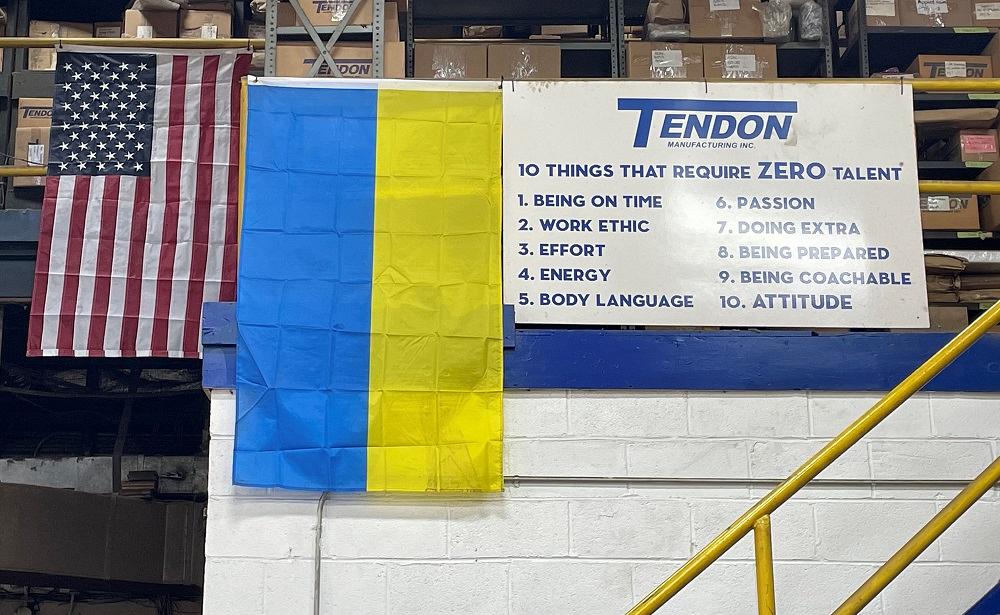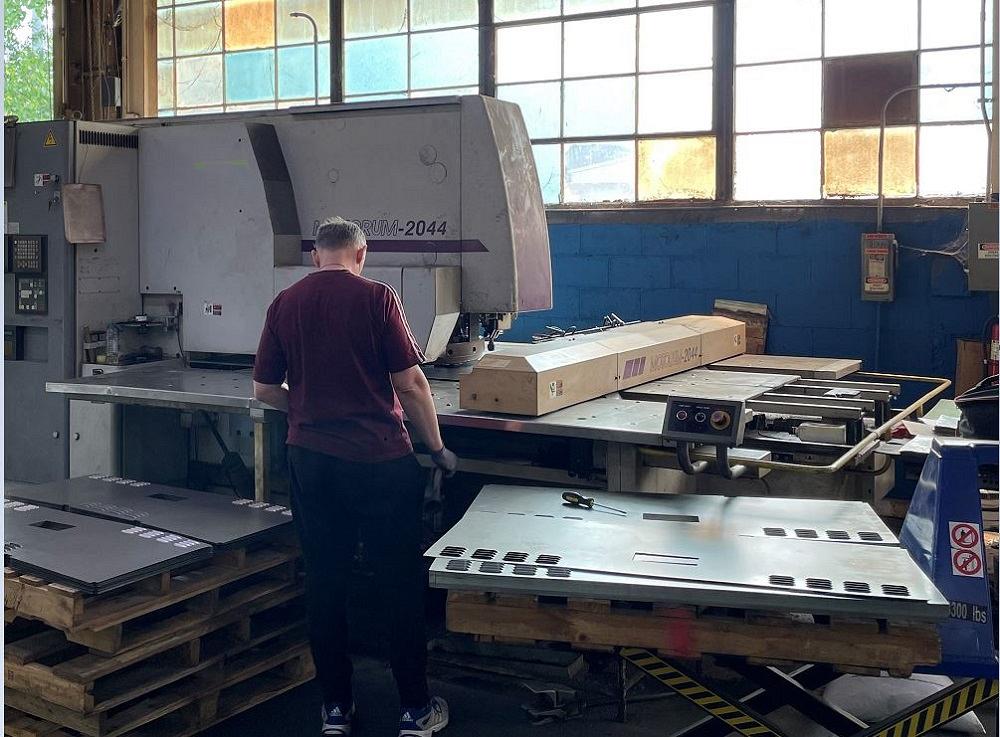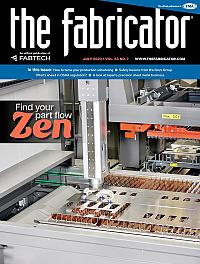Senior Editor
- FMA
- The Fabricator
- FABTECH
- Canadian Metalworking
Categories
- Additive Manufacturing
- Aluminum Welding
- Arc Welding
- Assembly and Joining
- Automation and Robotics
- Bending and Forming
- Consumables
- Cutting and Weld Prep
- Electric Vehicles
- En Español
- Finishing
- Hydroforming
- Laser Cutting
- Laser Welding
- Machining
- Manufacturing Software
- Materials Handling
- Metals/Materials
- Oxyfuel Cutting
- Plasma Cutting
- Power Tools
- Punching and Other Holemaking
- Roll Forming
- Safety
- Sawing
- Shearing
- Shop Management
- Testing and Measuring
- Tube and Pipe Fabrication
- Tube and Pipe Production
- Waterjet Cutting
Industry Directory
Webcasts
Podcasts
FAB 40
Advertise
Subscribe
Account Login
Search
Cleveland metal fabricator pursues a multifaceted hiring strategy through Ukrainian refugee community
Social media hiring campaign finds refugees with manufacturing experience, an eagerness to learn
- By Tim Heston
- July 6, 2023
- Article
- Shop Management

A Ukrainian flag hangs by Tendon’s “10 things that require zero talent” list, which sets the cultural tone for the company. The company values talent, but not without work ethic, punctuality, and other character attributes. Tendon Manufacturing
Fabricators can’t find people. Year after year, survey after survey, that one challenge rises among all others, and the situation at Tendon Manufacturing is no exception.
The Cleveland-area custom fabricator had hosted hiring events and attended job fairs in recent years. Michael Gordon Jr., sales manager, recalled how he and his plant manager would just sit at a job fair booth all day. Few people stopped by, and even fewer applied for a job.
Over the past three years, Tendon’s hiring strategy has changed significantly. Gordon and his colleagues aren’t sitting idle at job fairs anymore. Instead, they’ve filled their ranks by, in essence, tapping into their surrounding community. They’ve implemented targeted social media campaigns through Facebook and tapped into a new source of available people who’ve been through hell and are eager to start anew. Today, the shop employs nearly 20 Ukrainian refugees.
One foundational element ties the two hiring strategies together. “My dad and my godfather started this company, and they did it to find any way they could to help people,” Gordon said.
This might be helping someone from a war zone get a new start or helping an experienced manufacturing worker, answering one of Tendon’s targeted Facebook ads, to find a more fulfilling job. In either case, the fabricator is there to help.
In-House Training
Tendon’s training practices set the foundation for its hiring strategy. Years ago, company leaders realized that finding good, experienced machine operators and welders is a rarity. It happens, of course, and Tendon certainly doesn’t turn away good people with experience. But leaders knew they couldn’t count on finding enough people to meet growing demand—hence the need for in-house training. To this end, a machinist who recently retired teaches after-lunch seminars to new hires and those looking to expand their skill set.
The fabricator also has an unusual sign on the wall, reading “10 things that require zero talent,” with a list that follows: (1) being on time; (2) work ethic; (3) effort; (4) energy; (5) body language; (6) passion; (7) doing extra; (8) being prepared; (9) being coachable; (10) attitude.
That, Gordon said, sets the cultural tone. It’s not about how many years of experience someone has or even how good they are at this or that job. It’s about showing up and being eager to help. People can learn and show talent for a particular skill, but the foundational elements—punctuality, a good work ethic, a positive attitude, and all the rest—have to be there.
Hiring Through Facebook
Before placing any ad, Tendon worked to build a base of followers to the company’s Facebook page, including elements that would engage the greatest number of people. Sure, the page showed welding sparks and laser cutting pierces, but also showed work from projects that would catch viewers’ eyes, like signage for the NFL, NBA, and MLB. “That started generating buzz,” Gordon said.
Next came the company’s first Facebook ads, most of which really didn’t gain much traction. The company wanted to find people with experience in welding, press brake operation, and laser cutting, but social media didn’t seem like a very good place to find them.

A Ukrainian refugee with manufacturing experience operates a punch press at Tendon Manufacturing. Tendon Manufacturing
At this point, Gordon and his team realized that, with their existing in-house training, they could place ads that could reach the broadest audience in the local area. And humor was key. One ad showing the cast of “The Office” playing basketball in Dunder Mifflin’s warehouse attracted more than 200 applicants.
Tendon had some early successes, paying for some ads to be boosted (to get more favorable treatment in searches). In 2021, more than 25 of Tendon’s new hires came from these general-interest Facebook ads.
That said, those early successes didn’t snowball into something bigger. Over time, results from those ads became less than optimal. Casting a wide net can work for certain jobs, but not all. Sure, someone with no exposure to manufacturing might become an expert press brake or laser machine operator one day. The anecdotal evidence abounds (including various stories written in this magazine), but for Tendon at least, such success stories weren’t the norm.
“So, we’ve since fine-tuned our Facebook strategy,” Gordon said. “Instead of casting a wide net, we geared our ads toward areas near manufacturing centers in the metro area.”
First, the company had to determine where those pockets of manufacturing were. So, they purchased lists of local manufacturing plants from Crain Communications, publisher of Crain’s Cleveland Business, to get an idea of where their employees live. They also used resources from career centers that helped pinpoint where exactly those looking for work in the trades were living.
“All this data helped us make an educated guess as to where these skilled people were living,” Gordon said. “That helped us fine-tune our net, to find that fishing hot spot.”
This gave Tendon’s leaders the geographic area they needed to target their Facebook ads, but they knew they needed more. After all, those first ads looking for skilled people fell flat, mainly because they reached nearly anyone who logged onto Facebook within a geographic region. They needed to reach those with manufacturing experience.
To find them, Gordon headed to the shop floor and started asking skilled operators questions—not about their job, but about themselves, their hobbies, and other interests. Facebook is in the data business, but it isn’t a place where people post about their jobs at length. It’s not a career-focused site, yet it does have a vast user base, an attribute that initially attracted Tendon to the platform. Moreover, advertisers can target ads based on people’s Facebook viewing habits, and those habits usually center around hobbies and other interests outside work.
The more Gordon talked with skilled people on the floor, the more he learned. Many welded in their garage as a hobby. Others liked sports, cars, fishing, and hunting—no surprises there. One of the shop’s machinists was really into U.S. military history and recreational mathematics. The second-shift supervisor, also an experienced brake operator, was really into gardening.
Gordon found a few common threads. One, most hobbies involved some kind of hands-on work. Two, most activities involved scrutinizing the details: This tweak helps gain a certain level of performance in that car; this fertilizer works best to grow that vegetable; this military offensive helped win the battle under these conditions. Tendon had the beginnings of a kind of psychographic analysis for the skilled worker, revealing what makes them tick and, ultimately, making it more likely to click on a targeted Facebook ad.
According to Gordon, the approach yielded some good results. “We were able to bring in a really skilled welder who actually wasn’t welding at his current job. He said he was essentially a button pusher, but he had welding experience. ‘That’s what I really want to do,’ he told me. And I told him, ‘We’ve got plenty of welding work. Do you want to come weld?’ He’s been wonderful on second shift, and getting people to work second or third shift isn’t easy. But he told me he was a night owl and would rather have time to be outside during the day.”
Gordon emphasized that the candidate had real welding experience. It wasn’t just an occasional hobby. Could Tendon have reached him with an untargeted social media ad? Maybe, but targeting the ad likely increased the odds.
The Ukrainian Refugee Community
Gordon conceded that the shop’s success with Facebook has waned. The fabricator has found no silver bullet, no “one way” to find good people. The best employees find out about Tendon in various ways and come from various places—even overseas.
“I do a lot with Catholic Charities and different organizations throughout Cleveland,” he said. “And I have a Ukrainian friend who owns a small business. She’s been here for about 25 years, and I’ve always told her, if she has family or friends that want to come over, feel free to give them my information. In November [2022], she approached me and asked, ‘Is that offer still on the table?’ I said, ‘Absolutely.’ She gave my name to a few family members. They started working, and their friends came over and started working too. It just started spreading from there.
“Once I talked to Catholic Charities about it, they started sending me more people. Once the flood gate was open, it was open. We work to ensure we have all the proper documentation [for the refugees to start working], but many times, they come over to the U.S. with all that documentation in hand.”
What about the language barrier? Gordon said that the shop employs one bilingual speaker (both refugees) for each shift. Beyond this, “Google Translate has been my best friend,” adding that the language barrier has helped the company streamline some of its communication and documentation practices. For instance, managers and supervisors worked to have certain aspects of job travelers spell out exactly what things were and where. An inventory location before might have had a complex sequence of letters, each signifying something. But how often do workers really need all that information? Today, certain inventory locations are called out by a simple letter and number combination—A1, A2, etc.
“We had to work to simplify, to make things easier,” Gordon said, adding that this in turn made procedures simpler for everyone, English and non-native English speakers alike.
Some Ukrainian refugees even have manufacturing experience, though not in metal fabrication specifically. Still, their life experience might have an even more significant effect on job performance. Most of Tendon’s Ukrainian refugees come from war zones, and at least four have actual combat experience.
“They’ve seen a lot,” Gordon said. “Still, they don’t want anything for free. They want to work for what they have, and they’re proud of what they do. They’re also starting to use some English.”
He recalled seeing one shipping department employee start several months ago. She did her job, but kept quiet. Now, with broken English, she’s started to joke around with her fellow employees. “She’s starting to feel happy here, I think,” Gordon said. “It’s so great to see it, considering what she and others have gone through.”
Roughly half of the Ukrainian refugees plan to return once the war is over, while the other half (mostly younger) plan to start a new life in the states—though, of course, this might change depending on how the Ukrainian conflict progresses. For a Ukrainian, Cleveland isn’t a bad place to be, considering its existing population of Ukrainian immigrants, many of whom live in the Ukrainian Village part of town.
And the Ukrainian’s presence at Tendon is being felt. At a recent staff meeting, someone talked about all-employee catered lunches. They’ve had Italian lunches, Mexican lunches—but what about a Ukrainian lunch? In the future, Tendon employees might get their first taste of Ukrainian banush.
About Community Connection
Tendon’s story exemplifies some of the newest and oldest ways of finding and hiring good people. Many multigenerational fab shops can trace their history back to immigration, with grandparents or great-grandparents escaping war-torn lands. Then comes the fabricator’s targeted use of social media at both ends of the spectrum: a broad approach for a wide net and more clicks, and a targeted approach with geographic- and interest-specific data.
Hiring isn’t easy, especially now. There’s no one “right” way, no silver bullet. Ultimately, hiring is about making local connections, especially in manufacturing, where hiring remote workers (at least those on the shop floor) just isn’t an option. All hiring strategies have their virtues, as long as they establish those connections and help a fabricator succeed—be it through clicks on Facebook or sharing Ukrainian banush at a company lunch.
About the Author

Tim Heston
2135 Point Blvd
Elgin, IL 60123
815-381-1314
Tim Heston, The Fabricator's senior editor, has covered the metal fabrication industry since 1998, starting his career at the American Welding Society's Welding Journal. Since then he has covered the full range of metal fabrication processes, from stamping, bending, and cutting to grinding and polishing. He joined The Fabricator's staff in October 2007.
subscribe now

The Fabricator is North America's leading magazine for the metal forming and fabricating industry. The magazine delivers the news, technical articles, and case histories that enable fabricators to do their jobs more efficiently. The Fabricator has served the industry since 1970.
start your free subscription- Stay connected from anywhere

Easily access valuable industry resources now with full access to the digital edition of The Fabricator.

Easily access valuable industry resources now with full access to the digital edition of The Welder.

Easily access valuable industry resources now with full access to the digital edition of The Tube and Pipe Journal.
- Podcasting
- Podcast:
- The Fabricator Podcast
- Published:
- 04/16/2024
- Running Time:
- 63:29
In this episode of The Fabricator Podcast, Caleb Chamberlain, co-founder and CEO of OSH Cut, discusses his company’s...
- Trending Articles
Tips for creating sheet metal tubes with perforations

Are two heads better than one in fiber laser cutting?

Supporting the metal fabricating industry through FMA

JM Steel triples capacity for solar energy projects at Pennsylvania facility

Omco Solar opens second Alabama manufacturing facility

- Industry Events
16th Annual Safety Conference
- April 30 - May 1, 2024
- Elgin,
Pipe and Tube Conference
- May 21 - 22, 2024
- Omaha, NE
World-Class Roll Forming Workshop
- June 5 - 6, 2024
- Louisville, KY
Advanced Laser Application Workshop
- June 25 - 27, 2024
- Novi, MI


























